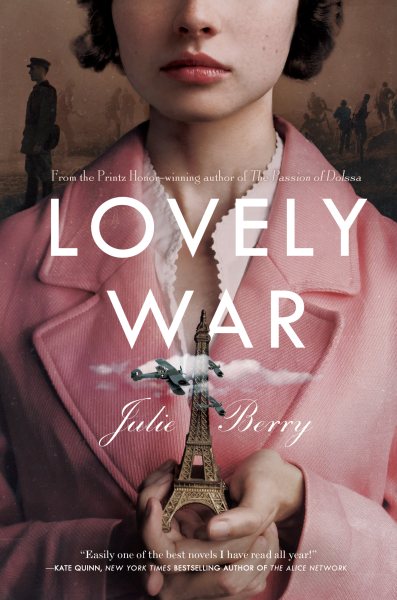by Trianne Harabedian
The Nightingale. All The Light We Cannot See. The Guernsey Literary and Potato Peel Pie Society. I loved them, you loved them. If we’re being honest, there’s just something about a beautifully written World War II novel, with intrigue and tragedy and a little romance, that’s like literary catnip. We can’t get enough.
 So I absolutely have to tell you about another book that you are going to love: Lovely War by Julie Berry. It’s a little different from the others. It’s got the intrigue, the tragedy, and more than a little romance. But… it’s set during World War I. Gasp! How can such a novel exist without Nazis, the brazenness of women in the forties, the preexisting tragedy of a world that had not yet recovered from the Great War? I promise that not only can it work, but it can work so beautifully that you’re not going to be able to put this novel down.
So I absolutely have to tell you about another book that you are going to love: Lovely War by Julie Berry. It’s a little different from the others. It’s got the intrigue, the tragedy, and more than a little romance. But… it’s set during World War I. Gasp! How can such a novel exist without Nazis, the brazenness of women in the forties, the preexisting tragedy of a world that had not yet recovered from the Great War? I promise that not only can it work, but it can work so beautifully that you’re not going to be able to put this novel down.
It’s 1942. The goddess Aphrodite is in a hotel room with her lover, Ares, when her husband, Hephaestus ensnares them in a net. As they argue about love, Aphrodite offers to illustrate her points by telling the story of four mortals living during World War I. As she weaves her tale, the other gods help by telling their perspectives on certain events. Aphrodite covers the romance, Apollo the music, Ares the war, and Hades the death.
The story begins with Hazel, a sheltered girl who lives in London and plays piano. On this particular evening, she is playing at a war benefit when she notices a young man standing to the side. Their eyes meet, Aphrodite gives them a nudge, and that’s it. Suddenly they’re sneaking out of their homes to meet for coffee, attending the symphony, and falling in love while knowing James will leave in a week for the war front. Unfortunately, their time is cut short when he is summoned to training a few days early. Their romance continues to blossom via letters, and Hazel decides that she needs to help with the war effort. To her parents’ dismay, she moves to Saint-Nazarie, France, as an entertainment volunteer for the troops.
This is where Aphrodite introduces us to our second couple. Colette is an orphan from Belgium, her life ravaged by the war, who seeks solace in volunteering for others. She and Hazel become fast friends at the YMCA where they are stationed. They bond over their love of music and their frustration over the segregation among the soldiers. The girls are shocked that they are not even allowed to enter the colored camp, as Colette is a foreigner and Hazel comes from a very accepting family. But they soon find a way to get around the rule.
Aubrey is a jazz prodigy who has been dragged into a military band. When he hears Hazel playing piano one evening, he can’t help but sneak into the building, introduce himself, and sit down to play. And when Colette steps out of her room in nothing but a scandalous nightgown, everything is over for Aubrey. He returns night after night, after the girls’ supervisor has gone to bed, to play piano and win Colette’s heart. He has nearly succeeded when, after a horrifying incident with some Americans from another camp, he is forced to unexpectedly go on tour with the band. Because of the incident, he doesn’t feel that he can write to Colette, and she is left aching at his sudden disappearance.
With both couples separated, the novel twists and turns. The mortals are given small tastes of love as Aphrodite schemes to allow them to meet for a few days here and there. But the war breaks them all. No one escapes the pain of violence, racial oppression, and death. No one is left mentally, physically, or emotionally unscathed. But their love for each other, both romantically and as four friends, remains steadfast.
I laughed, I cried, and I read this book far too quickly. Then, for days afterward, I didn’t want to read anything else. It’s the next beautiful war novel that we’re going to recommend to all our friends and talk about for years. It’s the novel I didn’t know I was waiting for.


Comments are closed.